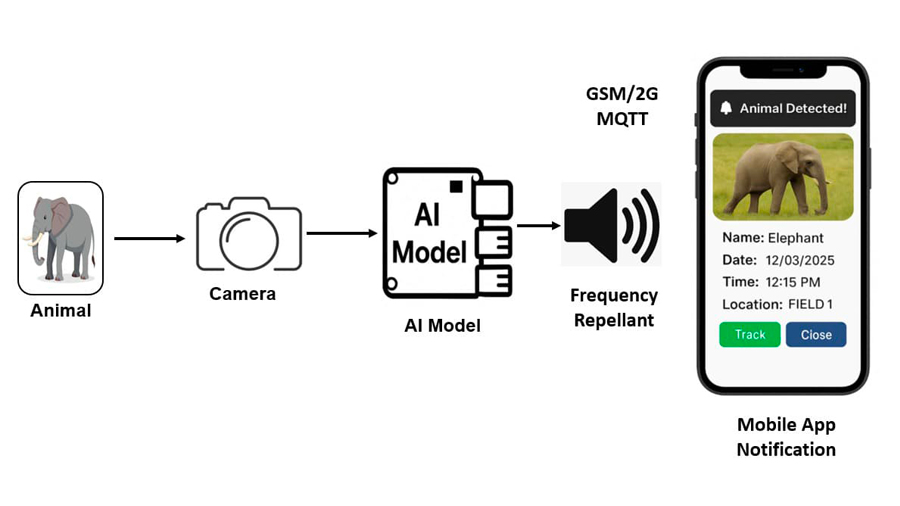 An Artificial Intelligence-based farm security system designed by College of Science and Technology (CST) students is showing promise in tackling human-wildlife conflict. It offers a cheaper and more intelligent solution to protecting crops. The innovation was one of the highlights at the third International Conference on Science, Engineering and Technology, which concluded in Thimphu today.
An Artificial Intelligence-based farm security system designed by College of Science and Technology (CST) students is showing promise in tackling human-wildlife conflict. It offers a cheaper and more intelligent solution to protecting crops. The innovation was one of the highlights at the third International Conference on Science, Engineering and Technology, which concluded in Thimphu today.
At the event, a device designed to repel animals from intruding on farmlands, which was developed by a group of CST students captured the attention of participants. The device, which integrates Artificial Intelligence and the Internet of Things (AIoT), can detect animals entering farmland and trigger an alarm to deter them based on their hearing frequency.
The students came up with the innovation as a possible alternative solution to electric and chain-link fences, which are expensive. Additionally, they said the device will be an upgrade to the existing animal repellent systemsthat have several limitations.
Jigme Sherub Phuntsho, a student of College of Science and Technology said “For example, if the system detects an elephant, it will recognise theelephants hearing frequency range, which is unique from other animals. Accordingly, the device will emit an alarm in that specific frequency range to ward off the elephant.”
The device developed as part of the college’s AI –based animal intrusion detection system will be piloted in Zhemgang and Trongsa.
The International Conference on Science, Engineering and Technology saw participants from Bhutan, Nepal, Malaysia and Sweden sharing their research findings. The conference emphasised the crucial role research plays in socio-economic development.
Noah Andreasson and Linda Lundevaller, Master’s Student from Lund University, Sweden said “We will present our primary findings here during the conference. We hope that this serves as a good platform for us to both network with all the scientists within Bhutan and internationally and also to share our findings to more people.”
Sonam Eyden, a student of College of Science and Technology said “Apart from the knowledge shared by DHI and Gyalsung Infra on how to develop our economy, we also shared our research findings. Therefore, I learnt that youth are also playing an important role in nation building.”
Tshering Tobgyal, another student, College of Science and Technology said “We came here to sensitise the policy makers through our research findings and I hope other youths in Bhutan will also support them.”
The College of Science and Technology jointly organized the event with the Construction Development Corporation to foster research linkages and collaborations among Bhutanese and international universities and agencies in the field of engineering, science and technology and renewable energy.
Cheki Dorji (PhD), President of College of Science and Technology said “We can give opportunities to the teachers and students as well as various agencies and departments. Moreover, through the knowledge sharing of international teachers and students who have come here, we get to learn new ideas.”
Lok Bahadur Ghalley, General Manager of Corporate Strategy Office, CDCL said “We are proud for the collaboration of the conference between CDCL and CST. The main aim of the conference is to improve education, promote new ideas and uplift industrial expertise. Moreover, it is to promote networking between the institutions and students.”
The conference, known as the ICSciEnTec is an annual event bringing together various stakeholders to realise how research can address social issues and bring about innovations in Bhutan.
Kelzang Chhophyel
Edited by Kipchu










